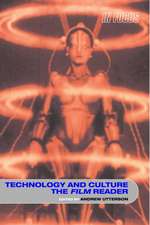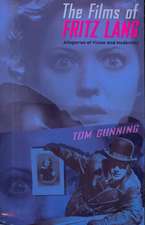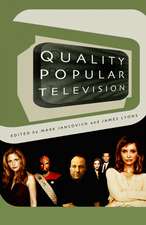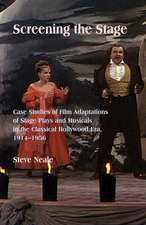From IBM to MGM: Cinema at the Dawn of the Digital Age
Autor Andrew Uttersonen Limba Engleză Paperback – 12 ian 2011
Preț: 231.42 lei
Nou
Puncte Express: 347
Preț estimativ în valută:
44.30€ • 46.23$ • 37.14£
44.30€ • 46.23$ • 37.14£
Carte disponibilă
Livrare economică 19 februarie-05 martie
Preluare comenzi: 021 569.72.76
Specificații
ISBN-13: 9781844573233
ISBN-10: 1844573230
Pagini: 171
Ilustrații: 52 b/w photos
Dimensiuni: 155 x 235 x 15 mm
Greutate: 0.38 kg
Ediția:2011
Editura: British Film Institute
Colecția British Film Institute
Locul publicării:London, United Kingdom
ISBN-10: 1844573230
Pagini: 171
Ilustrații: 52 b/w photos
Dimensiuni: 155 x 235 x 15 mm
Greutate: 0.38 kg
Ediția:2011
Editura: British Film Institute
Colecția British Film Institute
Locul publicării:London, United Kingdom
Descriere
Andrew
Utterson's
unique
study
charts
the
beginnings
of
digital
cinema,
addressing
both
how
filmmakers
used
new
digital
technologies
and
how
attitudes
and
anxieties
about
the
rise
of
the
computer
were
represented
in
films
such
as
Lang'sDesk
Set,
Godard'sAlphaville,
Kubrick's2001:
A
Space
Odysseyand
Crichton'sWestworld.
Cuprins
Introduction.- Computers
in
the
Workplace:
IBM
and
the
'Electronic
Brain'
ofDesk
Set(1957).- From
the
Scrap-Heap
to
the
Science
Lab:
The
Pioneers
of
Computer
Animation.- Tarzan
vs.
IBM:
Humans
and
Computers
inAlphaville(1965).- Digital
Harmony:
The
Art
and
Technology
Movement.- 'I'm
Sorry
Dave,
I'm
Afraid
I
Can't
Do
That':
Artificial
Intelligence
in2001:
A
Space
Odyssey(1968).- Expanded
Consciousness,
Expanded
Cinema:
A
Techno-Utopian
Counterculture.- To
See
Ourselves
as
Androids
See
Us:
The
Pixel
Perspectives
ofWestworld(1973).- Conclusion.- Filmography.- Bibliography.- Index.
Notă biografică
ANDREW
UTTERSON
Senior
Lecturer
in
Film
and
Digital
Media
at
Canterbury
Christ
Church
University,
UK.
He
is
the
editor
ofTechnology
and
Culture:
The
Film
Reader(2005)
and
co-editor
ofFilm
Theory:
Critical
Concepts
in
Media
and
Cultural
Studies(2004).
Textul de pe ultima copertă
At
once
both
timely
and
historically
grounded,From
IBM
to
MGM:
Cinema
at
the
Dawn
of
the
Digital
Ageexplores
the
history
of
cinema's
earliest
encounters
with
computers,
as
film-makers
responded
to
the
flurry
of
digital
devices
that
emerged
in
the
post-war
decades.
Capturing
the
fervour
and
fears,
hysteria
and
hyperbole,
technophilia
and
technophobia
of
a
crucial
period
of
digital
revolution,
film-makers
in
a
range
of
contexts
sought
to
respond
to
the
computer
as
a
new
technology,
one
with
profound
significance
for
cinema
and
the
wider
world.
Whether in films in which computers 'starred' on screen (from Jean-Luc Godard'sAlphavilleand Stanley Kubrick's2001: A Space Odysseyto Walter Lang'sDesk Setand Michael Crichton'sWestworld) or in those produced using this same technology (the films of John Whitney, Stan VanDerBeek and other pioneers), what the cinema of this era shared was a willingness to engage with the computer head-on, exploring and exploiting the essential qualities of new tools as connections were forged between the worlds of cinema and computing.
Whether in films in which computers 'starred' on screen (from Jean-Luc Godard'sAlphavilleand Stanley Kubrick's2001: A Space Odysseyto Walter Lang'sDesk Setand Michael Crichton'sWestworld) or in those produced using this same technology (the films of John Whitney, Stan VanDerBeek and other pioneers), what the cinema of this era shared was a willingness to engage with the computer head-on, exploring and exploiting the essential qualities of new tools as connections were forged between the worlds of cinema and computing.
Caracteristici
Provides
a
unique
historical
perspective
on
the
development
of
digital
cinema
Tackles both the use of digital technologies by filmmakers and their representation in cinema
Case studies include Godard'sAlphaville(196, Kubrick's2001: A Space Odyssey(1968) and Crichton'sWestworld(197
Richly illustrated with stills from the BFI's collection
Tackles both the use of digital technologies by filmmakers and their representation in cinema
Case studies include Godard'sAlphaville(196, Kubrick's2001: A Space Odyssey(1968) and Crichton'sWestworld(197
Richly illustrated with stills from the BFI's collection














